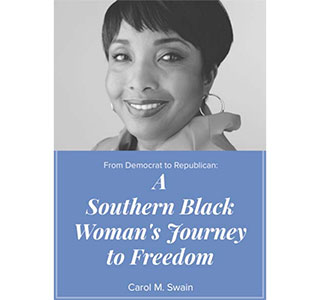Live from Music Row Thursday morning on The Tennessee Star Report with Michael Patrick Leahy – broadcast on Nashville’s Talk Radio 98.3 and 1510 WLAC weekdays from 5:00 a.m. to 8:00 a.m. – host Leahy welcomed all-star panelist Dr. Carol Swain to the studio.
During the third hour, Swain discussed growing up around systemic racism in Southwest Virginia during the 50s and 60s and reflected on seeing federal and state laws passed to end it. She went on to discuss the idea that systemic racism ended around 1975 and that identity politics was a dangerous game to be played and that “we need to move beyond that towards the American national identity.”
Leahy: Michael Patrick Leahy here and our good friend, all-star panelist, Carol Swain. We are glad to have her back in town. We missed her. And our audience missed her. I think she missed us didn’t you Carol?
Swain: I certainly did. Okay.
Leahy: You had a very busy schedule. You did something with the Prager University folks. Tell us about that.
Swain: Yes, I recorded my fifth individual video and it was a life lessons of video that should be released around Martin Luther King’s birthday. And it was me giving advice based on my experiences and I can tell you one thing that I did address which is this argument about systemic racism. and my position is I was born into systemic racism.
Leahy: Let me just stop. You were born at some time before 1960.
Swain: 1954. The year of the Brown versus the Board of Education case that desegregated schools. And so as a child, I watched systemic racism being dismantled. (Laughs)
Leahy: Let’s just stop for a moment. That’s a very significant statement that you just made. As a child growing up poor in Southwestern Virginia you watched the dismantling of systemic racism. Explain that in more detail for our audience.
Swain: Well, I watched the 1964 Civil Rights Act being passed. It was passed when I was 10 years old. I watched the 1965 Voting Rights Act being passed. I watched the 1968 Open Housing Act being passed. I watched the rise of affirmative action. And just the color blindness under the law happened while I was a child and as a consequence, it created many opportunities for people like me and also for White women too because they were protected by the civil rights laws that protected me and other people.
And all I ever wanted was an equal opportunity to prove and show others what I could do. And so I never wanted special. And that was the case I think for most Black people that I have encountered that have been very successful. If you look at someone like Bob Woodson, I mean, he’s born I think in 1937. There are so many older Black people that were born long before 1954, they could have used their race. And they could have used the institutional systemic racism that actually did exist when they were young as excuses. And they didn’t. But that’s a small part of my video.
But the video is meant to encourage people. Because even if you were raised and born in affluent circumstances it still matters what you think and what you do. You know your attitude. I mean you can squander everything. You can be born into the wealthiest most loving family and still end up, you know with a miserable life. And so it’s all about choices. So I recorded a video and I was also interviewed by Candace Owens.
I’m not sure when her interview is going to be released. But I’m excited about the Prager U videos that I’ve already done. And I’ve already done two interviews with them. They have reached over 67 million people and everywhere I go young people, high school students, older people recognize me and they come up to me.
But the Prager people tell me that young people were right. Or they will say that watching one of my videos changed our lives and that’s why they’re conservative. And you think about me leaving the university where you get in maybe 30 people to a class. And so you touch as many people as you can touch. I say my classroom is the world because through Prager U and those five-minute videos I’m able to reach far more people than I could have touched in one classroom.
Leahy: I think you’re absolutely right about that. I want to talk a little bit about this notion that you’ve raised which is entirely accurate historically. And that you grew up born in 1954. You cited several laws passed at the federal level in the 1960s that ended systemic racism at the federal level. In your view, when did systemic racism and in the United States under the legal institutions at the federal level and at the state level? What date would you pick for the end of systemic racism?
Swain: Well, I would say certainly the 1960s was when we made an effort. That was when the Immigration Naturalization law was passed. Also in 1965 that ended quotas on certain nations. and that certainly changed the landscape of America. And I’ve always seen America as a country that has tremendous opportunities for people who are willing to work and when I hear systemic racism, right now, it seems like the racism that I see and I know this is controversial and I’m not supposed to say this stuff.
Leahy: Go ahead and say it.
Swain: But it does seem to work a little bit against White people. Especially young White males.
Leahy: Liberal heads are exploding around the country as you say that.
Swain: But it’s true. And the shaming that takes place on college campuses. And the indoctrination. Like I’m sure you remember that we were always taught that it was harmful to children to shame them.
Leahy: But it’s institutionalized now at 98 percent at schools of higher education.
Swain: And you know the shame young children about something that our ancestors allegedly did or because they have White skin it is so un-American. And it has nothing to do with you know Judeo Christian heritage it is wrong. And what bothers me is that not enough people are speaking up. And I may seem like I’m criticizing the church a lot and maybe I am. And I know that people are well-intentioned.
But they seem to have bought into the Left’s argument that only White people can be racist because the Left is always said ever since I was in school that people of color couldn’t be racist because you had to have the power to be racist. And I have you know, growing up in a world where people of color have gotten increasingly more power. They are in positions where they can exert it over other people. And racism can come from any group.
Leahy: If I were to make a statement would you say this is a correct or incorrect statement? If I were to make this statement that systemic institutional racism in the United States was over and ended by 1975 at both the state and federal levels, which you agree with that statement or not?
Swain: I would agree with it as it relates to people of color. And then what the Left will point to is the fact that the outcomes are not the same for Blacks. Blacks are always at the bottom and have the highest crime rates. They usually have the highest unemployment. And if you look at conditions in many Black communities they are worse off. But what we’re not allowed to talk about is the culture and the attitudes that affect life outcomes.
And so it’s definitely harder whether you’re White or Black. Or if you’re born into a family without resources. But the America that I grew up in there were plenty of people that saw someone that was hard-working playing by the rules and they went out of their way to help that person and it was not based on their race or skin color. It’s something about America and how we love success stories and we will rally behind someone that’s working hard.
Leahy: Yeah, I think it’s a very good point and I think this is perhaps the most important argument that’s not made sufficiently in the mainstream media at all. And that is that systemic racism in the United States ended in 1975.
Swain: They have created new racism. And like in 2002 I wrote the book the new White nationalism in America. It’s challenged integration. And for you White folks that are my supporters. It’s not beating up on White people. It’s based on interviews and things that I did back then. But what is taking place today in this identity politics. It’s always been destructive. And we need to move beyond that towards the American national identity. And the arguments of the political left I think is fueling racial tensions and is creating a backlash and bringing race where it doesn’t belong.
Leahy: This is a message the entire country needs to hear Carol. And I’m glad our listeners get to hear it.
Swain: Thank you.






